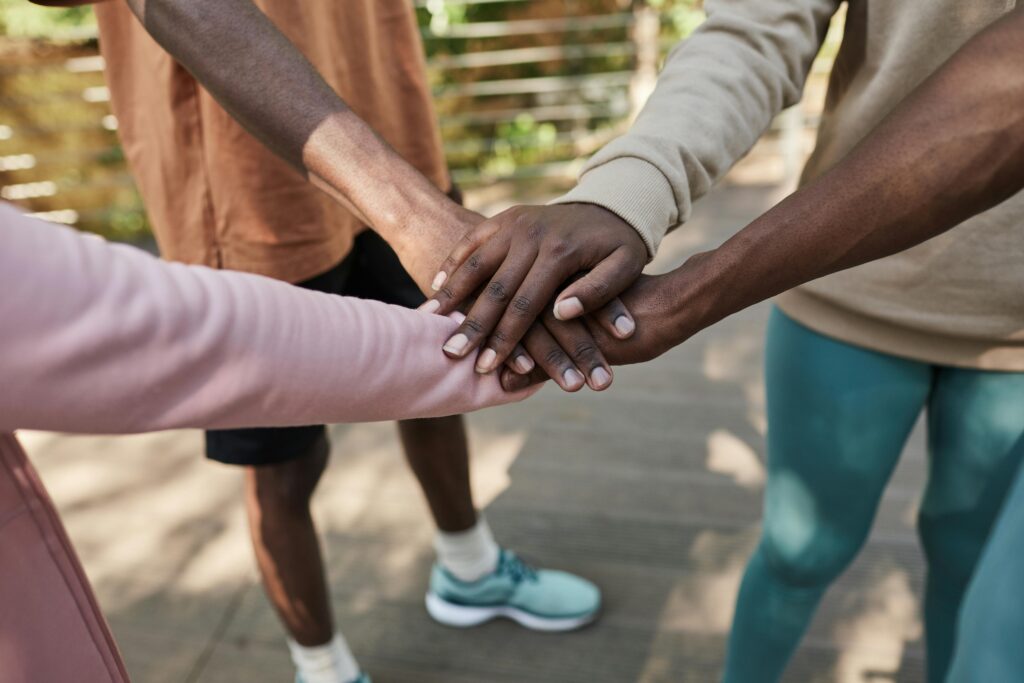WHAT IS IN THE PROGRAM?
In total there are 13 sessions:
- 3 individual sessions, 1-2½ hours, including testing – before the program, mid
program, and after the 8th group session. - 9 group sessions with program content (2 hours) typically starting at 5pm on the designated evening, although times may change with offerings. The first 8 are in consecutive weeks, the 9th 4 weeks after that.
- 1 testing session to evaluate the retention of gains made in the program, typically around 2 months after the 9 th group session. (1-1½ hours)
Thus sessions occur across a roughly 5-6 month period, with the first 11 sessions occurring,
roughly, in consecutive weeks and the final 2 sessions occurring about 4 and 12 weeks after the 11th session.
The program has five stages. What you can expect to happen at each stage, and in each session, are detailed below:
Stage 1 - Come in, stay in.
Initial session. This is an individual session involving the teenager, a parent or parents and some RES@T team members. This will occur in the fortnight before the first program group session, at a time agreed between the parent and the RES@T team. In this session:
- The teenager and parent(s) will be introduced to the program and will discuss that teenagers specific situation and needs;
- The teenager will be given a unique ID that will allow us to match data from different time points in the program, but in a way that makes that teenager unidentifiable in the main data set;
- The parent and teenager will each complete some online questionnaires while they are at the session;
- The teenager may also undertake some cognitive function tests. [Note: the tests are for evaluation and research purposes only. We do not provide results or a report to parents].
Stage 2 - Psychoeducation - Gain insight, get bright
Group sessions for teenagers
Program session 1: Participants get to know each other and discuss their own situations. Teams are formed and various games are played. Statistics and facts about problematic gaming are provided to help participants better understand the problem and to know that they aren’t alone in having a problem with video games. Participants reflect on when gaming wasn’t a problem for them and then set goals for the program.
Program session 2: In this session participants reflect on their own gaming behaviour, learn about what can cause problematic and disordered gaming, explore motivations to change gaming behaviour, and start to create their own explanation for why gaming has become a problem for them.
Stage 3 - Clever clogs instead of underdogs
Group session for teenagers.
Program session 3: Eat, sleep, exercise, repeat.
In this session participants learn how gaming impacts a healthy lifestyle and how a healthy lifestyle, including sufficient sleep, can help them manage their gaming better. Participants reflect on how their gaming has impacted their sleep and daily routines.
Program session 4: Self care for confidence.
In this session participants learn about self care
and regulating self-esteem. They explore their talents and strengths, and use a decision-making tool to identify offline areas of strength, and offline activities they would enjoy or like to develop.
The mid program review: This is an individual session involving the teenager, a parent or parents and some RES@T team members, that occurs in the week following program session 4. Individual feedback is given on the teenager’s progress and their training plan is evaluated. Any issues are discussed.
Stage 4 - Relation and Connection
Group sessions for teenagers
Program session 5: The circuit of emotions.
The teenagers will learn about the functions their emotions have, and about functional and dysfunctional emotion regulation. Participants reflect on the roles their emotions play during game play and about their own style of managing emotions, and create a list of strategies to use when under stress.
Program session 6: Social relationships.
Participants reflect on the advantages and disadvantages of face-to-face versus online relationships, and the need for F2F relationships is discussed. Participants create their own social network as a basis for potential offline relationships and learn important communication and relationship skills.
Program session 7: Communication skills. Participants learn to differentiate between verbal and physical communication, and between communication that is validating versus invalidating. Participants learn about (cyber-)mobbing and rules of respectful interactions.
Stage 5 - Keeping the Strength
Group session for teenagers
Program session 8: Relapse prevention.
Participants learn about addiction memory and the
concept of craving. They receive an anti-relapse plan and create a list of possibly risky situations that could lead back to problematic gaming. They add to the relapse plan problematic behaviours that could lead to a returning to old habits. Self-control strategies are also discussed. Training plans are evaluated and the winning team is announced.
Post-Program session: This is an individual session involving the teenager, a parent or parents and some RES@T team members that occurs in the fortnight following program session 8.
- Individual feedback will be given on the teenager’s progress
- The emergency plan will be revised/updated as needed
- The parent and teenager will each complete some online questionnaires;
- The teenager may also undertake some cognitive function tests.
Group session for teenagers
Program session 9: Booster session. In this session, which is run about 4 weeks after Program session 8, there is an open group discussion, participants reflect on their progress, and the team offer assistance in maintaining healthy game use. Crucially, participants receive their gift certificate at a ceremony after this session. So the teenagers only attend the one hour booster session. Then parents, guardians, family and friends arrive for the presentation of certificates of achievement to the teenagers in the program, and the celebration (where there will be plenty of yummy food!).
Retention testing: This is an individual session involving the teenager, a parent or parents and some RES@T team members that occurs about 8 weeks after the booster session. This is where we collect the final data that will help us understand whether the teenager has retained
gains made during they program.
- The parent and teenager will each complete some online questionnaires;
- The teenager may also undertake some cognitive function tests.

When are the next sessions?
We don’t know yet. The first round of offerings, which were self-funded and relied fully on
the generosity of hard-working volunteers and its host, Mind and Me Psychology, is now
complete. Sadly, the program cannot be sustained on this basis. We are currently seeking
funding to continue the program, but sadly, have had no success to date, despite the huge need.
We are also talking to the Macquarie University Psychology Clinic, who are discussing the
possibility of hosting some new offerings that would run from the clinic. However, if this
works out, it will take some time to set up RES@T-A Australia at the clinic and to train
facilitators. If things go as planned sessions may be running in late 2024 or early 2025.
What is the cost?
Currently this program is free for participants. It is possible that coming offerings may have a
small fee to cover the costs of materials for participants. This will be made clear to applicants
when we respond to any applications.
What is the commitment?
Because this program is very resource intensive and comes at no cost to participants, we expect all participating teens and their parent or guardian to commit, to the best of their ability, to attending EVERY session they are allocated to. The same parent or guardian needs to attend every testing session and answer the questionnaires, but this person does not have to be the one who drops off and picks up the child from the group sessions. We do understand that sometimes participants may need to withdraw from the program (this is discussed in the Participant Information and Consent Form that program participants sign).

What are the likely benefits?
- Many participants in RES@T-A programs in both Australia and Germany have reported clear benefits from it, but not all do. Currently about a third of teenage participants make very strong gains, about a third make pleasing gains, and about a third make only small gains. Stronger gains tend to be associated with the amount of work both the teenager and their parent(s) put into making changes, and doing so consistently over time. We cannot guarantee any benefits, but benefits for a number of participants seem likely;
- There have also been benefits for some the families so far participating – meeting other families facing similar issues, feeling supported, making positive progress on screen problems in the house, and reducing conflicts around screen use. Again, such benefits are not guaranteed, but benefits for some families seems likely;
- There are very few treatment programs for problematic screen use and screen disorders in Australia, and these are usually very costly. Most are not screen-specific. This is a specialised program that comes at no or little cost.
Where is the program?
TBA. We hope to have offerings in late 2024 or early 2025 at the Macquarie University Psychology Clinic. Watch this space!
Timetable
TBA. Watch this space!

